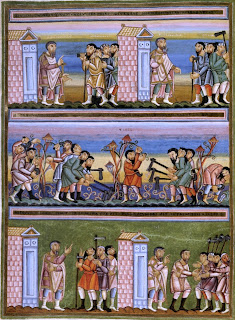1st Trinity I
Matthew 20:1-16
 |
| Codex aureus Epternacensis, 11th century |
into his vineyard.
"At about nine o'clock, he went out and saw others standing in the marketplace, and he said to them, 'Go also into my vineyard, and I will give you whatever is right.' So they went.
"He went out again at about noon and at three o'clock and did the same. At five o'clock, he went out and found others standing there, and he said to them, 'Why do you stand here all day idle?' They said, 'Because no one has hired us.' He said, 'You, too, go into the vineyard.'
"And when evening came, the master of the vineyard said to his steward, 'Call the workers and give them their wages, beginning with the last ones hired and going on to the first.'
"Those who had been hired at five o'clock came forward, and each received one denarius. Therefore, when it was the turn of those hired first, they expected to receive more. However, they, too, also received one denarius each. They took it, but they began to grumble against the master of the house. 'These men who were hired last only worked one hour, and you have made them equal to us, who have borne the burden of the work and the heat of the day.'
"However, he answered one of them, saying, 'Friend, I am not being unjust to you. Did you not agree with me for one denarius? Take what you have earned and go. I wish to give to the one hired last the same as I give to you. Have I not the right to do as I wish with what is mine? Or do you give me an evil look because I am generous?'
"Thus will the last be first and the first will one day be last."
1st Trinity I
February 6, 2022
Matthew 20:1-16
If I want to lift a weight, I have to exert continuous effort to keep it raised. If I let go, it immediately falls. This is how things go in the kingdom of the earthly—objects are subject to the downward pull of the law of gravity. They require continuous effort to keep them raised.
In the kingdom of life, however, another law prevails. Sunlight continuously draws enormous masses of matter skyward in the form of water vapor, trees, and plants. The sky kingdom operates according to the laws of levity. Even our bodies respond to its upward pull.
Today's gospel reading is about working not in the earthly kingdom but in the life kingdom. Different rules apply here. The workers are thinking only in earthly terms—the amount of effort expended determines the rewards received. But we are all working not only on fields of earth but in fields of heaven as well. What is important in the heavenly kingdom is that the work be done by all, to the best of their ability, according to heavenly time, and not for the purposes of personal reward.
The heavenly kingdom, like the sun, sends us its warmth. It draws
us upward. For millennia, human beings have been like vines, producing fruits
of devotion, love, and prayer. Catherine of Sienna sees the ripening fields of
humanity and says:
The sun hears the fields talking about effort
and the sun
 |
| Van Gogh |
and whispers to me:
"Why don't the fields just rest, for
I am willing to do
everything
to help them
grow?"
Rest, my dears, in
prayer.*
Behind today's parable about labor, effort, and reward lies a further theme: in the heavenly kingdom of life, for whom is the harvest intended? The parable says that the Master who owns the field is the kingdom of the heavens itself, with all its divine beings. The angels, and even God, need our willing cooperation in the work of the harvest. They are awaiting the harvest of the soul-spiritual substance we have to offer.
And so, to the realm of uplift, light, and life we offer our purest thoughts, the love of our hearts, and our willing devotion. We offer ourselves to the Master's harvesting of souls so that we become the wine of angels, the strengthening and gladdening of God. Then, likewise, all receive what they need as the day's sustenance.
*"Rest in Prayer," Catherine of Siena, in Love Poems
from God, Daniel Ladinsky, p. 195




























